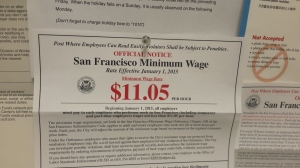Partners Are Protected from Retaliation for Reporting Harassment / Discrimination
 In Fitzemons v California Emergency Physicans Med. Group 205 Cal.App. 4th 1423 (2012), the Appellate Court held that the anti-retaliation provisions of FEHA (Fair Employment and Housing Act) protect not only employees but also partners in a business partnership. In that case, the plaintiff was an emergency physician and a member of a partnership. At one point the plaintiff was promoted to the regional director position. She was terminated and removed from partnership shortly after she reported to her supervisors that certain officers and agents of the partnership were sexually harassing some of the female employees.
In Fitzemons v California Emergency Physicans Med. Group 205 Cal.App. 4th 1423 (2012), the Appellate Court held that the anti-retaliation provisions of FEHA (Fair Employment and Housing Act) protect not only employees but also partners in a business partnership. In that case, the plaintiff was an emergency physician and a member of a partnership. At one point the plaintiff was promoted to the regional director position. She was terminated and removed from partnership shortly after she reported to her supervisors that certain officers and agents of the partnership were sexually harassing some of the female employees.
The Defendants attempted to dismiss the case by arguing that only employees and not partners are protected from retaliation. The Appellate Court disagreed, noting that FEHA makes it unlawful to retaliate against “any person” for opposing unlawful workplace harassment. This anti-retaliation protections extends to partners as well as employees, unlike many other labor law protections which only apply to employees.
This decision is a powerful holding, as it arguably extends the anti-retaliation protections of FEHA anti-retaliation provisions to contractors and temporary workers as well, if the courts continue to interpret the “any person” language of the FEHA statute literally and broadly.
Workplace Mental Disabilities Rights and Bipolar Disorder
 Recently, the Fourth District Court has published its decision in Wills v. Superior Court – a very important opinion on workplace mental disabilities rights at workplace. That case addressed a not uncommon situation, where an employee who has been diagnosed with mental disorder, such as bi-polar disorder, has been found to make threats of violence to his co-workers and management. After being fired for making those threats, that employee sued the employer for wrongful termination and disability discrimination.
Recently, the Fourth District Court has published its decision in Wills v. Superior Court – a very important opinion on workplace mental disabilities rights at workplace. That case addressed a not uncommon situation, where an employee who has been diagnosed with mental disorder, such as bi-polar disorder, has been found to make threats of violence to his co-workers and management. After being fired for making those threats, that employee sued the employer for wrongful termination and disability discrimination.
The court’s analysis and holding was very practical and made a lot of sense. First, the court recognized the 9th Circuit cases that held that “conduct resulting from a disability is considered to be part of the disability, rather than a separate basis for termination” Gambini v. Total Renal Cares, Inc. (2007). Although the above cases considered disability-related misconduct, such as performance issues, tardiness or absenteeism, none of the above cases considered how to deal with disability-caused misconduct involving threats of violence against coworkers. The court concluded that neither ADA nor other laws require employers to retain employees who threatens or commits acts of violence against coworkers, even if the employee’s disability caused that kind of misconduct.
The court further interpreted FEHA (Fair Employment and Housing act) as authorizing an employer to distinguish between disability-caused misconduct and the disability itself in the narrow context of threats of violence against coworkers. The court noted that if the employers are not permitted to do that, they are caught in a serious and unreasonable dilemma. On one hand they may not discriminated against disabled workers. On the other hand they are obligated to to provide all employees with a safe work environment, free from threats of violence (Cal. Lab. Code 6300). Certainly, disability rights have to yield to the workplace safety.
New San Francisco Minimum Wage Effective January 1, 2015
 Starting from January 1, 2015, the San Francisco minimum wage increased to $11.05 / hour. This increase reflects the recognition by the authorities of a significantly higher cost of living in the city, driven up by the tech boom, the shortage of housing and the soaring prices for studios and one bedroom apartments.
Starting from January 1, 2015, the San Francisco minimum wage increased to $11.05 / hour. This increase reflects the recognition by the authorities of a significantly higher cost of living in the city, driven up by the tech boom, the shortage of housing and the soaring prices for studios and one bedroom apartments.
Today, it would not be unusual to see a studio in one of the luxury high rises downtown to rent for $3,000/month and above, and for one-bedroom units to go for $3,500 and above. Because there is sufficient number of high earners in the area who can afford paying this much in rent in order to enjoy the convenience of living downtown and being able to walk to their office, these prices are not expected to go down, in the absence of some kind of unforeseen event, such as unexpected economic slowdown.
$11.05/hour is certainly not high enough compensation to be able to afford decent housing of any size in any part of San Francisco, but it’s a step in the right direction. Employer have an obligation to have the posting on the image above prominently displayed in the office (typically in the kitchen/rest area) along with other labor / employment posters required to be displayed by law.
Definition of Misconduct and Unemployment Benefits
 Under California Unemployment Insurance Code, “misconduct” associated with employment termination is defined as substantial, willful violation of a known employer rule or policy. This definition of misconduct is generally favorable to employees-claimant as it requires the violation to be serious and intentional or at least grossly negligent. The employer has a burden to prove misconduct in order to have the employee disqualified from receiving unemployment benefits. Ordinary mistakes, negligence, substandard performance, and lacking in qualifications are not considered misconduct and are therefore not grounds for denying unemployment benefits.
Under California Unemployment Insurance Code, “misconduct” associated with employment termination is defined as substantial, willful violation of a known employer rule or policy. This definition of misconduct is generally favorable to employees-claimant as it requires the violation to be serious and intentional or at least grossly negligent. The employer has a burden to prove misconduct in order to have the employee disqualified from receiving unemployment benefits. Ordinary mistakes, negligence, substandard performance, and lacking in qualifications are not considered misconduct and are therefore not grounds for denying unemployment benefits.
There are a two important things worth noting about misconduct:
- The employer might argue but the employer does not determine whether the reasons for your termination qualify as misconduct. They can only provide the facts about the reasons for your termination. EDD or CUIAB make their own independent determination of whether misconduct took place.
Important Information about Retaliation Claims in California
Retaliation claims are some of the most common employment law cases filed in California, and usually in conjunction with a wrongful termination claim. It is important for any potential plaintiff in a wrongful termination case to consider whether he can also include a retaliation claim because retaliation is often easier to establish or prove than discrimination and other types of violations. This is because under certain circumstances, a retaliation claim may be brought by an employee who has engaged in a protected activity of complaining or opposing unlawful discrimination or harassment, even when a court or jury subsequently determines that the conduct was actually not unlawful (Flait v North American Watch Corp). Under the law, an employee is protected against retaliation if the employee reasonably and in good faith believed that he whatever he was opposing constituted unlawful employer conduct.
For instance, the court in Drinkwater v Union Carbide Corp. held that even though the employee was not able to establish a hostile work environment claim based on a few isolated incidents, she was able to make a retaliation claim, because she reasonably and in good faith believed that the harassers highly offensive sexual remarks constituted harassment when she made a protected complaint about the same to her higher management.
This is actually a very common workplace scenario. Imagine that you complain to your human resources department about feeling harassed or discriminated by your immediate supervisor. Your hr office conducts an investigation and they determine that not discrimination or harassment took place. Subsequently, your supervisor-harasser retaliated against you by writing you up and firing you. You bring several claims in court for 1. wrongful termination; 2. discrimination; 3. retaliation.
Don’t Let Your Workers Compensation Claim Hurt Your Wrongful Termination Case
 Many disability discrimination and wrongful termination cases involve a workers compensation claim. One mistake that a wrongful termination claimant should avoid is exaggerating his/her disability when dealing with his workers comp doctors. Stating to the doctor that you are completely unable to work with or without accommodations as a result of your work related injury might increase your workers comp benefits, but it can also “kill” your wrongful termination case, if that case is based on failure to accommodate or failure by your employer to provide reasonable accommodations to you in violation of FEHA and ADA. This is because you can’t claim on one hand that the employer didn’t accommodate you and discriminated against you because of your disability or medical condition, and on the other hand be so incapacitated that no accommodation would be feasible that would allow you to return to work. Remember – an employer doesn’t have to accommodate you if there is no reasonable accommodation available to your condition, given your essential job duties.
Many disability discrimination and wrongful termination cases involve a workers compensation claim. One mistake that a wrongful termination claimant should avoid is exaggerating his/her disability when dealing with his workers comp doctors. Stating to the doctor that you are completely unable to work with or without accommodations as a result of your work related injury might increase your workers comp benefits, but it can also “kill” your wrongful termination case, if that case is based on failure to accommodate or failure by your employer to provide reasonable accommodations to you in violation of FEHA and ADA. This is because you can’t claim on one hand that the employer didn’t accommodate you and discriminated against you because of your disability or medical condition, and on the other hand be so incapacitated that no accommodation would be feasible that would allow you to return to work. Remember – an employer doesn’t have to accommodate you if there is no reasonable accommodation available to your condition, given your essential job duties.
You should of course always be truthful about your physical limitations and your ability or inability to perform some or all of your job duties. Your attorney should be able to guide you through the interplay between your workers comp claim and your wrongful termination / disability discrimination case and find the best strategy for both of your cases that would allow you to maximize the benefit from both of your cases without letting your workers comp claim interfere with your ADA / FEHA court claims.
A Major Sacramento Healthcare Provider is Sued for Disability Discrimination
A major health care provider Dialysis Clinic Inc. was sued for disability discrimination this week by EEOC. The lawsuit has been filed in the Eastern District Court in Sacramento.
The plaintiff Francisca Lee had worked at the company’s facility on East Southgate Drive in South Sacramento for 14 years when she was diagnosed with cancer. She took medical leave to have a mastectomy and chemotherapy, according to the allegations in the EEOC complaint. Four months later, according to the complaint, the company notified Lee by mail that she was being terminated for exceeding the time limit dictated by its medical leave policy
At the time of Lee being fired, she had been cleared by her physician to return to work without restrictions in less than two months, the complaint says. Lee, 71, was told she would have to reapply for an open position. However, when she did apply a little more than two months later, she was rejected. Not long after, according to a claim in the complaint, the company hired a newly-licensed nurse. Of course, the employer has denied all allegations like they always do.
Unemployment Benefits – Not Signing PIP/Warning is No Longer “Misconduct”
This week, the California Supreme Court reversed a prior troubling decision where one appellate court held that an employee’s refusal to sign an acknowledgment form that he received a warning or PIP notice is misconduct within the meaning of unemployment insurance code, disqualifying that employee from unemployment benefits. In other words, until now – if an employee was fired for refusing to sign a warning or a PIP or any other kind of disciplinary notice, and he was terminated for just that alone, he would not have qualified for unemployment benefits.
In the most recent decision Paratransit Inc. v Unemployment Ins. Appeals Board, filed on July 3, 2014, the supreme court held that a good faith refusal to sign a disciplinary notice is not a misconduct within the meaning of Unemployment Insurance Code section 1256. Among other arguments supporting that decision, the highest Court of the state pointed that this decision is in line with the law in the other states. As long as the an employee’s decision to refuse to sign a disciplinary paperwork is “reasonable” and it doesn’t cause some kind of harm to employer’s operation, being terminated for that alone will not disqualify him from receiving unemployment benefits.
You can find the full decision of this case here.
Small Employers Can Be Liable For Sexual/Racial Harassment and Discrimination
Under FEHA (California Fair Employment and Housing Act) anti-discrimination laws, only employers who employ five or more employees can be liable for unlawful discrimination. This means that the FEHA protection against workplace discrimination generally does not extend to employees who work for smaller employers. However, in limited circumstances there is a way around this issue. Unfortunately, it only applies to racial/ethnic and religious discrimination as well as discrimination based on sex or gender, and not to other types of discrimination (such as disability discrimination).
An employee who was subjected to or fired due to ethnic/racial/religious discrimination or sex discrimination can a file a claim for wrongful termination based on the California Constitution Article 1 Section 8, which provides: A person may not be disqualified from entering or pursuing a business, profession, vocation, or employment because of sex, race,
creed, color, or national or ethnic origin.



